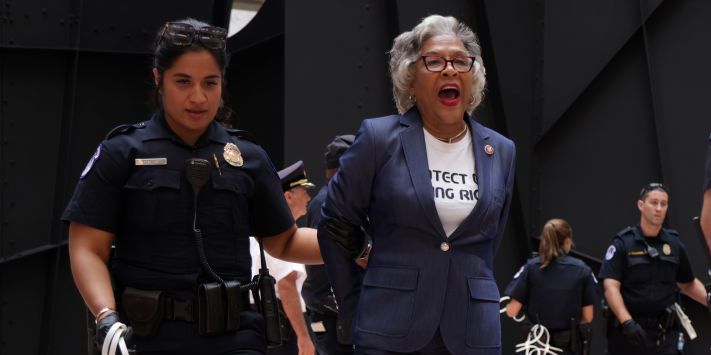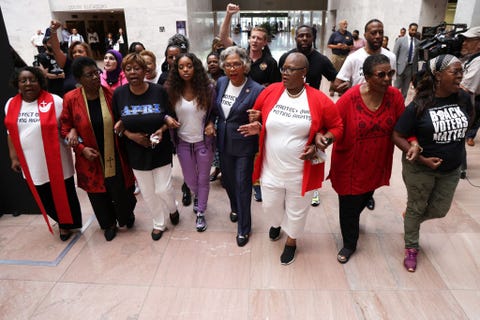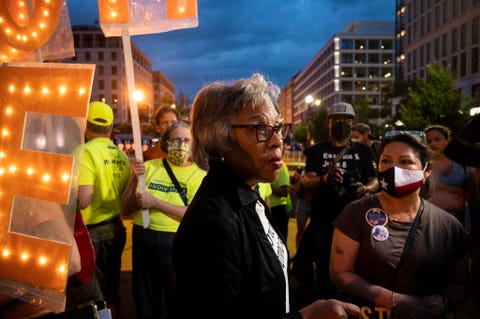Voting rights in America under attack. Just this year, states across the country have passed dozens of restrictive voting laws, while Republicans continue to block comprehensive voting reform legislation in the U.S. Senate. The U.S. Supreme Court also recently gutted what remained of the landmark Voting Rights Act of 1965—a law that the late Congressman John Lewis helped get passed—leaving even fewer protections in place.
To send a message about what’s at stake, Congresswoman and Chair of the Black Congressional Caucus Joyce Beatty joined a group of voting rights activists inside the Hart Senate Office Building on Thursday to peacefully protest—and was promptly arrested. The same day she tweeted: “You can arrest me. You can’t stop me. You can’t silence me.” Below, in her own words, Beatty tells ELLE.com why she felt called to march that day and why she isn’t stopping now.
When I got up on Thursday morning, I wanted to feel empowered. I was very conscious in choosing my dress code. My shirt, which read “Protect Our Voting Rights,” was obvious. I wore a red, white, and blue beaded bracelet that was made in Africa. I draped myself in the red, white, and blue of democracy. It was important for me to make a statement about who I am—a strong Black woman who wanted to stand tall for other young girls.
That day, I joined an intergenerational group of Black female leaders and allies to stand up to protect our voting rights. The Voting Rights Act was passed 56 years ago, and yet we are still revisiting how to protect our rights today. We’ve witnessed Senate Republicans refusing to engage in meaningful dialogue in drafting federal legislation to ensure all Americans have equal access to vote. We’ve just been visited by members of the Texas delegation, who came to D.C. in order to block voter restrictions in their state. So when the clarion call came to stand up, to say something, to do something, to get the attention of the nation, I said absolutely. I really thought this could be a moment in history, and I wanted to be a part of it.
As Chair of the Congressional Black Caucus, the John Lewis Voting Rights Advancement Act is our number one issue. And as a Black woman, it was important for me to do more than just say this is our issue. Think about the power of one. One person can make a difference. Rosa Parks did it. Martin Luther King Jr. did it. Fannie Lou Hamer did. Harriet Tubman did it. So why not Joyce Beatty?
On the day of the protest, we met at the United Methodist Church with a common message: This is our time to follow in the footsteps of John Lewis. That is how we determined most of the words we used: “When you see something that is not right, say something.” “Get in good trouble.” “No turning back.” We took it to the sidewalk and the streets to march, to sing, to hopefully let the American people know: We know what we have to lose, and we know what we have to fight for.
So we decided we would go to the U.S. Senate. There we were, in the Hart Building, and we were singing and expressing our desire to stop voter suppression. We were advised we could not do that in that space, and at that point, we were fighting for justice. I don’t know that I heard all three of the warnings. I did hear the first, but we were determined that it was worth us peacefully protesting. It was worth us accepting whatever consequences. I was there for John Lewis, at any cost, and that meant even being arrested.
This content is imported from Twitter. You may be able to find the same content in another format, or you may be able to find more information, at their web site.
At the Jan. 6 insurrection, you had thousands of people damaging federal property, rushing and breaking down doors. People were dying. There was nothing peaceful about it. And look what happened. That day there were no arrests, no handcuffs, no paddy wagons. But this is just another reason why we have to speak up. This was all the more reason for me to fight for justice, including being arrested, if necessary.
Our history has taught us that when people speak out, it makes a difference. On Saturday night, I was at the Black Lives Matter Plaza with many of the eight women who got arrested with me. People were on the Plaza with signs, some that were five-feet, that lit up, signs that men and women, Black, brown, and white, carried that said, “Pass H.R. 4,” the John Lewis Voting Rights Advancement Act, and “Pass H.R. 1,” the For the People Act. If this becomes contagious and people stand up, then we’ll no longer have to fight for our very right to vote.
Right now, we have so much to lose. We’re going back to the days of needing to guess how many jelly beans are in a jar in order to vote. Some people can’t even give someone a bottle of water while they’re waiting in line to vote. In Ohio, if you’ve ever served time for a felony, they’re trying to take away your right to vote. Think of the worst cases of voter suppression. Think of people taking away early voting. Think of the unnecessary hurdles to suppress you from voting. My Republican colleagues in state houses are deliberately passing legislation that will set us back 56 years.
Just a few weeks ago, my granddaughter told some classmates, “My grandmother is a big deal.” This is about her future. It’s about my grandson, as a young Black man, being able to move forward and leave a legacy and say, “My grandmother fought for justice, and now look at me.” It’s about the present and the future. It’s about making a statement. And we’ll be in the battle for as long as we’re needed.
This interview has been edited and condensed for clarity.
This content is created and maintained by a third party, and imported onto this page to help users provide their email addresses. You may be able to find more information about this and similar content at piano.io


